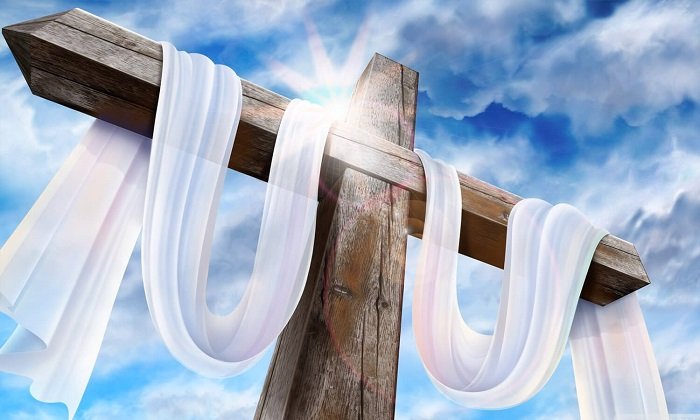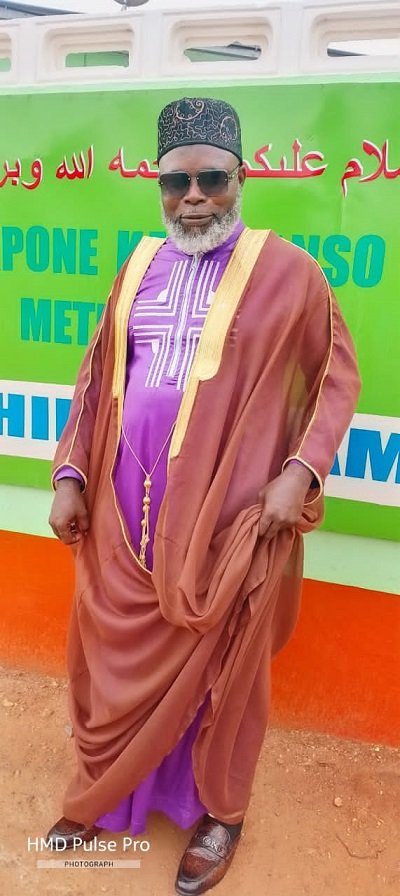Fruitful Living
Living the transformed life (Part 1)

• The Bible reveals God’s truth
For the grace of God has appeared that offers salvation to all people. It teaches us to say “No” to ungodliness and worldly passions, and to live self-controlled, upright and godly lives in this present age, while we wait for the blessed hope—the appearing of the glory of our great God and Saviour, Jesus Christ, who gave Himself for us to redeem us from all wickedness and to purify for Himself a people that are His very own, eager to do what is good. – Titus 2:11-14.
INTRODUCTION
Beloved in Christ I am writing to you today as the carrier of a message that is fundamental to our place as Christians in our society. I sincerely pray that after hearing this message, we will all be challenged to do more for God, for country, and for ourselves.
Living the transformed life as a Christian has everything to do with national development. I’ll tell you why.
The transformed life is a life shaped anew by God, to serve and fulfill God’s purpose for mankind. Living the transformed life is a process, a journey that we each embark on when we personally accept and invite Jesus Christ to become Saviour and Lord of our lives. Our lifestyles must reflect the God we profess and embrace.
Where do we start from? By examining and practising some principles that have been clearly spelt out for us in the Bible.
- Let’s Live an exemplary life no matter where you are: Philippians 2:15 advises us to ‘…become blameless and harmless, children of God without fault in the midst of a crooked and perverse generation, among whom you shine as lights in the world’.
This Bible verse is clearly telling us to do what is right whether other people are doing it or not. It is telling us to live differently, to strive to live above reproach, so that just as light drowns out darkness, our conduct shall be an example that others will be provoked to respect and to live by.
- Let’s Eschew self-centredness by looking out for the interests of each other: Philippians 2:4 tells us ‘Let each of you look out not only for his own interests, but also for the interests of others.’
This is an indirect way of telling us to be selfless in all our pursuits. As humans, we are naturally prone to selfishness. It is this selfishness that makes us take decisions and carry out certain actions that only favour us even if they are detrimental to our fellow humans.
- Let’s not wait for the government to do everything: James 2:14-16 – “What good is it, my brothers, if a man claims to have faith but has no deed? Suppose a brother or sister is without clothes and daily food. If one of you says to him, “Go, I wish you well; keep warm and well fed” but does nothing about his physical needs, what good is it?”
There are some things we can do as individuals in our own small way. This, I believe, is intended to make Christians understand that using our resources to assist less privileged people in society is an opportunity for us to exercise our faith and to honour God.
- Stewardship requires faithfulness: Now it is required that those who have been given a trust must prove faithful – 1 Corinthians 4:2.
Everything we have has been entrusted to us by God and as stewards, He expects us to be faithful in handling/managing what has been given to us. The first thing God entrusted to us from day one of creation was the earth.
- Let’s respect authority and national laws: 1 Peter 2:13- ‘Submit yourselves for the Lord’s sake to every human authority: whether to the emperor, as the supreme authority, or to governors, who are sent by him to punish those who do wrong and to commend those who do right. For it is God’s will that by doing good you should silence the ignorant talk of foolish people. Live as free people, but do not use your freedom as a cover-up for evil; live as God’s slaves. Show proper respect to everyone, love the family of believers, fear God, honour the emperor. Slaves, in reverent fear of God submit yourselves to your masters, not only to those who are good and considerate, but also to those who are harsh.’
This scriptureencourages us to respect authority not just at face value but out of respect for God and hierarchies created to establish order in society. Respect for authority keeps us in check and forces us to exercise discipline in fulfilling our obligations (e.g. payment of taxes, pension contributions, etc.) towards the development of the nation.
- Let’s be content: Hebrews 13:5 tells us ‘Let your conduct be without covetousness, and be content with such things as you have’ and 1 Timothy 6:6 says ‘Now godliness with contentment is great gain’. I may be wrong but I believe that contentment is the antidote to greed and covetousness which breed corruption in various forms and at various levels in our society. There is nothing wrong with being ambitious but there is a difference between being ambitious and being covetous. Most of the woes of our nation today could/would be avoided if Christians in diverse positions of authority, influence, and power remember this Scripture and pause in their excessive pursuit of material things. Let’s examine our hearts and our motives in our pursuit of money and material things. Are we seeking to acquire something or more of something because we truly need it or because we want to out-compete someone else? Are we living within our means or beyond it? Only we can truthfully answer these questions.
- Let’s eschew idleness: The Bible is clear on this. 2 Thessalonians 3:10 explicitly puts it this way ‘…if anyone will not work, neither shall he eat.’ We all know from our basic economic lessons that employment drives productivity at all levels within the economy. If no one works, nothing gets done, nothing gets produced and revenue generation channels simply cease to exist. Working does not always require us to be employed by others. The fact that God has called us to live a transformed life is no excuse for us to spend 24 hours in church when we should be at our workplace offering our services and/or generating income/revenue. There is time for everything. Jesus Christ Himself gave us this counsel in Mark 12:17‘Render to Caesar the things that are Caesar’s and to God the things that are God’s’.
- Let’s pursue justice and fairness in all our dealings: God expects us to be fair, honest, and truthful in all our dealings.
Colossians 4:1 says “Masters, give your bondservants what is just and fair, knowing that you also have a Master in heaven”.
To be continued!!
Stay blessed!
Please continue to join us on Asempa 94.7 FM – Sunday 5.30 am., Sunny 88.7 FM – Tuesdays 5:30 am; and YFM 107.9 – Sundays 6.30am; for our Radio Bible Study as well as Sunny FM 88.7 FM every Sunday at 3:30 pm. for Hymn and their Stories.
By Dr. Joyce Aryee, the author
Fruitful Living
Eid-ul-Adha: A living legacy of faith, sacrifice, and devotion

We begin in the name of Allah, the Most Merciful, the Most Compassionate. We praise Him, seek His help and forgiveness, and seek refuge in Him from the evils of our souls and the wrongs of our actions.
May peace and blessings be upon the Prophet Muhammad (peace be upon him), his family, his noble companions, and all those who follow his path until the Day of Judgment.
Understanding the essence
of Eid-ul-Adha
Eid-ul-Adha, the Festival of Sacrifice, is one of the two major Islamic celebrations observed by Muslims across the world.
It commemorates the unwavering submission of Prophet Ibrahim (Abraham, peace be upon him) to Allah’s command when he was prepared to sacrifice his beloved son Isma’il (Ishmael, peace be upon him). Allah, in His infinite mercy, intervened and replaced the son with a ram, thus honouring Ibrahim’s sincerity and faith.
This moment of sacrifice is recorded in the Qur’an: “Then when they had both submitted and he put him down upon his forehead, We called out: ‘O Ibrahim! You have fulfilled the vision.’ Indeed, We thus reward the doers of good.” (Surah As-Saffat, 37:103–105)
This act of obedience is not merely a historical account. It is a living symbol that forms the essence of Eid-ul-Adha.
Ibrahim (A.S): The Architect
of Submission
Before the moment of sacrifice, Prophet Ibrahim and his family played critical roles in establishing Islam’s foundational pillars:
1. The building of the Ka‘bah
Prophet Ibrahim and his son Isma’il were chosen to construct the Ka‘bah, the sacred House of Allah in Makkah. The Qur’an records this noble moment:
“And [mention] when Ibrahim was raising the foundations of the House and [with him] Isma’il, [saying], ‘Our Lord, accept [this] from us. Indeed, You are the Hearing, the Knowing.’”
(Surah Al-Baqarah 2:127)
This structure remains the spiritual centre of Muslim worship, facing which over a billion Muslims direct their daily prayers.
2. The struggle of Hajar (Hajara) between Safa and Marwa
The mother of Isma’il, Hajar (Hajara), exemplifies a profound lesson of patience and faith. Left in the barren valley of Makkah with her infant, she ran between the hills of Safa and Marwa, desperately searching for water. Her perseverance was rewarded when the well of Zamzam sprang forth at the feet of her baby.
Her sincere struggle is now ritualised in Hajj as the Sa‘i between Safa and Marwa—a reminder of the role of women, the power of du‘a, and the value of trust in Allah’s provision.
Sacrifice at Mina and the
Rites of Jamarat
During Hajj, pilgrims reenact Ibrahim’s confrontation with Shaytan at Mina, where he rejected the devil’s temptation and cast stones at him. This act is now observed in Hajj as the ritual of stoning the Jamarat, symbolising the rejection of evil, temptation, and disobedience.
It is a vivid spiritual lesson: the path to Allah is one of resistance to distraction and sin, and one must be prepared to fight these forces with unwavering faith.
The essence of Arafat in Hajj
The Prophet Muhammad said:“Hajj is Arafah.” (Sunan al-Tirmidhi, 889)
Standing on the plain of Arafat, in deep humility and supplication, is the heart of Hajj. It represents the Day of Judgment, when all of humanity will stand before their Creator. The Prophet said: “There is no day on which Allah frees more people from the Fire than the Day of Arafah.” (Sahih Muslim, 1348)
For pilgrims, Arafat is a time of repentance, reflection, and renewal— and for non-pilgrims, fasting on that day is highly recommended.
Three core lessons from the
Sacrifice of Prophet Ibrahim
(A.S.)
1. Absolute obedience to Allah
Ibrahim’s willingness to sacrifice his son teaches that the essence of faith is unquestioning obedience to Allah. He prioritised divine command over emotion, logic, or comfort.
Takeaway:
In our lives, we must also be ready to put aside our desires, egos, and even attachments if they conflict with Allah’s instructions. This may involve sacrifices such as waking up for Fajr, staying away from haram income, or being truthful in difficult situations.
2. Sincere intention and inner sacrifice
The real essence of the sacrifice lies in the heart’s submission to Allah.
It is neither their meat nor their blood that reaches Allah, but it is your piety that reaches Him.”
(Surah Al-Hajj 22:37)
Takeaway:
Every act of worship should be grounded in sincerity. Whether it is prayer, charity, or sacrifice, what matters most is the purity of our intention.
3. Sacrifice for the greater good
The legacy of Eid-ul-Adha teaches us that sometimes, faith requires us to give up what we love for a greater purpose. Sacrificing wealth, time, or status in the path of Allah or for the benefit of others leads to spiritual elevation.
Takeaway:
Use your resources such as time, money, skills, for acts of benefit: support the poor, educate the young, assist the sick, and build your community.
Celebrating Eid-ul-Adha: A
Festival for all Muslims
Even for those who do not go on Hajj, Eid-ul-Adha holds immense significance. Muslims across the world participate in the act of Qurbani (sacrifice) to honor the tradition of Ibrahim (A.S.).
Types of animals and their
symbolism
Permissible animals include goats, sheep, cows, and camels. Each must meet a minimum age and be free of defects. The sacrificed animal is then divided into three parts: one for the family, one for relatives and friends, and one for the poor and needy.
This distribution reflects the spirit of sharing, compassion, and social responsibility—values at the heart of Islam.
The eternal message of Eid-ul-Adha
Eid-ul-Adha is not merely a celebration; it is a living tradition that calls us to:
• Submit like Ibrahim,
• Strive like Hajar,
• Sacrifice like Isma’il,
• Reflect like the pilgrims at Arafat.
May this Eid awaken within us a renewed commitment to obedience, sincerity, and compassion.
Let us make every Eid-ul-Adha a step forward in our spiritual journey, embodying the values of submission, sacrifice, and service to humanity. I wish every Muslim Eid Mubaarak
By Imaam Alhaji Saeed Abdulai
(Kpone Katamanso Metropolitan Chief Imaam)
Fruitful Living
Steps taken by government to combat illicit drugs (Final part)
The Minister for the Interior, Muntaka Mohammed-Mubarak, has reaffirmed the government’s commitment to combating drug abuse and illicit trafficking for a safer environment which would
go a long way to make Ghana a drug-free country. 3News.com (2025)
Solutions to Illicit Drugs from the Islamic perspective
are comprehensive and emphasise of both prevention and treatment:
Tarbiyah (Islamic nurturing): Instilling strong Islamic values from childhood through Qur’anic education, regular prayer, and association with righteous companions.
Community preaching (Da’wah): Imams must consistently raise awareness during khutbahs and Islamic programs about the dangers of drugs and the beauty of a sober, productive life.
Faith-based rehabilitation: Mosques and Islamic centers can partner with medical institutions to offer Qur’an therapy, spiritual counseling, and structured recovery programs.
Islamic youth clubs: Providing youth with halal entertainment, mentorship, and purposeful engagement can steer them away from harmful peer groups.
Zakat and Sadaqah: Channelling funds to support families of victims and establishing centres for rehabilitation.
Role of Parents, Society, Muslim Chiefs and Imams:
Parents must be vigilant and provide emotional support. A loving, nurturing home reduces a child’s vulnerability to drugs.
Society should de-stigmatize addiction. Drug users should be seen as patients needing healing, not criminals deserving rejection.
Muslim Chiefs must lead community campaigns, setting moral examples and supporting policy enforcement.
Imams must be more than religious leaders—they must become counsellors, educators, and advocates. Their leadership can shift public perception and guide collective action.
Conclusion
Illicit drugs pose one of the most dangerous threats to our society, undermining our religious values, harming our youth, and destroying our future. The Islamic position is clear and
Unequivocal: such substances are forbidden due to their destructive consequences on all aspects of life. Islam does not merely condemn the act but calls for a holistic response—spiritual, social, and structural.
As a society, particularly as Muslims, we must rise to confront this crisis with faith, compassion, and commitment. We must not only preach against drugs but actively work to rehabilitate victims, educate the next generation, and partner with public institutions to create a society of wellness and righteousness.
Recommendations
1. Introduce Islamic drug awareness education in madrasas and public schools, using Quran and Hadith-based materials to instill moral responsibility.
2. Create partnerships between the Ghana Narcotics Control Commission, Ghana Health Service, and Muslim organisations to develop culturally sensitive rehabilitation centres.
3. Train Imams and teachers in basic mental health and drug abuse counselling to serve as front-line responders in communities.
4. Utilise Friday sermons (khutbahs) nationwide to address the dangers of drug abuse periodically and provide practical steps for prevention.
5. Encourage community surveillance, where parents, chiefs, and youth groups report dealers and suspicious activities to the authorities.
6. Establish mentorship programmes in every Muslim community where successful, drug-free role models mentor youth.
7. Form interfaith coalitions, working across religious lines to tackle the drug menace as a national threat rather than a religious issue.
8. Provide job skills training for rehabilitated victims, helping them reintegrate into society and live dignified, self-sufficient lives.
By Imam Alhaji Saeed Abdulai, the Author







